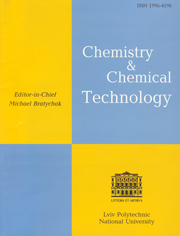Synthesis, Structure and Electrophysical Properties of Fluoride-Conducting Phases Вa1-XLaXSnF4+X
| Attachment | Size |
|---|---|
| 1.23 MB |
Keywords:
[1] Sandstrom, SK.; Chen, X.; Ji, X. A Review of Halide Charge Carriers for Rocking‐Chair and Dual‐Ion Batteries. Carbon Energy 2021, 4, 627-653. https://doi.org/10.1002/cey2.110
https://doi.org/10.1002/cey2.110
[2] Nowroozi, J. M.; Mohammad, I.; Molaiyan, P.; Wissel, K.; Reddy, M. A.; Clemens O. Fluoride Ion Batteries - Past, Present, and Future. J. Mater. Chem. A 2021, 9, 5980-6012. https://doi.org/10.1039/D0TA11656D
https://doi.org/10.1039/D0TA11656D
[3] Kumaravel, V.; Bartlett, J.; Pillai, S.C. Solid Electrolytes for High-Temperature Stable Batteries and Supercapacitors. Adv. Energy Mater. 2020, 11, 1-42. https://doi.org/10.1002/aenm.202002869
https://doi.org/10.1002/aenm.202002869
[4] Liu, T.; Peng, N.; Zhang, X.; Zheng, R.; Xia, M.; Zhang, J.; Yu, H.; Zhang, L.; Shu, J. Insight into Anion Storage Batteries: Materials, Properties and Challenges. Energy Stor. Mater. 2021, 42, 42-67. https://doi.org/10.1016/j.ensm.2021.07.011
https://doi.org/10.1016/j.ensm.2021.07.011
[5] Patro, L.N.; Hariharan, K. Fast Fluoride Ion Conducting Materials in Solid State Ionics: An Overview. Solid State Ion. 2013, 239, 41-49. https://doi.org/10.1016/j.ssi.2013.03.009
https://doi.org/10.1016/j.ssi.2013.03.009
[6] Mohammad, I.; Witter, R.; Fichtner, M.; Reddy, M. A. Introducing Interlayer Electrolytes: Toward Room-Temperature High-Potential Solid-State Rechargeable Fluoride Ion Batteries. ACS Appl. Energy Mater. 2019, 2, 1553-1562. https://doi:10.1021/acsaem.8b02166
https://doi.org/10.1021/acsaem.8b02166
[7] Mori, K.; Mineshige, A.; Emoto, T.; Sugiura, M.; Saito, T.; Namba, K.; Otomo, T.; Abe, T.; Fukunaga, T. Electrochemical, Thermal, and Structural Features of BaF2-SnF2 Fluoride-Ion Electrolytes. J. Phys. Chem. C 2021, 125, 12568-12577. https://doi:10.1021/acs.jpcc.1c03326
https://doi.org/10.1021/acs.jpcc.1c03326
[8] Dénès, G.; Hantash, J.; Muntasar, A.; Oldfier, P. Variations of BaSnF4 Fast Ion Conductor with the Method of Preparation and Temperature. Hyp. Int. 2006, 170, 145-158. https://doi:10.1007/s10751-006-9464-5
https://doi.org/10.1007/s10751-006-9464-5
[9] Chaudhuri, S.; Wang, F.; Grey, C.P. Resolving the Different Dynamics of the Fluorine Sublattices in the Anionic Conductor BaSnF4 by Using High-Resolution MAS NMR Techniques. J. Am. Chem. Soc. 2002, 124, 11746-11757. https://doi.org/10.1021/ja026155j
https://doi.org/10.1021/ja026155j
[10] Liu, L.; Yang, L.; Liu, M.; Li, X.; Shao, D.; Luo, K.; Wang, X.; Luo, Z. SnF2-Based Fluoride Ion Electrolytes MSnF4 (M = Ba, Pb) for the Application of Room-Temperature Solid-State Fluoride Ion Batteries. J. Alloys Compd. 2020, 819, 152983-153013. https://doi:10.1016/j.jallcom.2019.152983
https://doi.org/10.1016/j.jallcom.2019.152983
[11] Dudney, N.J.; West, W.C., Nanda, J. Materials and Energy - Vol. 6. Handbook of Solid State Batteries, 2nd ed.; World Scientific, 2015. https://doi.org/10.1142/9487
https://doi.org/10.1142/9487
[12] Liu, J.; Yi, L.; Zeng, P.; Zou, C.; Chen, X.; Tao, X.; Liu, X.; Yang, L.; Zang, Z.; Chang, B.; et al. Point Defect Engineering Enabled the High Ionic Conductivity of BaSnF4 for Solid-State Fluoride-Ion Batteries at Room Temperature. Energy Fuels 2022, 36, 15258-15267. https://doi.org/10.1021/acs.energyfuels.2c03509
https://doi.org/10.1021/acs.energyfuels.2c03509
[13] Patro, L.N.; Hariharan, K. Rare Earth Ions (Eu3+ and Nd3+) Doped BaSnF4: Transport and Photoluminescence Characteristics. Ionics 2013, 19, 1611-1617. https://doi.org/10.1007/s11581-013-0896-z
https://doi.org/10.1007/s11581-013-0896-z
[14] Liu, L.; Yang, L.; Shao, D.; Zou, C.; Luo, Z.; Wang, X. Nd3+ Doped BaSnF4 Solid Electrolyte for Advanced Room-Temperature Solid-State Fluoride Ion Batteries. Ceram. Int. 2020, 46, 20521-20528. https://doi:10.1016/j.ceramint.2020.05.16
https://doi.org/10.1016/j.ceramint.2020.05.161
[15] Zang, Z.; Liu, L.; Yang, L.; Luo, K.; Zou, C.; Chen, X.; Tao, X.; Luo, Z.; Chang, B.; Wang, X. Preparation and Performance of Eu3+-Doped BaSnF4-Based Solid-State Electrolytes for Room-Temperature Fluoride-Ion Batteries. ACS Sustainable Chem. Eng. 2021, 9, 12978-12989. https://doi.org/10.1021/acssuschemeng.1c04523
https://doi.org/10.1021/acssuschemeng.1c04523
[16] Zang, Z.; Liu, J.; Tao, X.; Zou, C.; Chen, X.; Yi, L.; Chang, B.; Wang, X. Mn2+ Doped BaSnF4-Based Solid State Electrolyte for Room-Temperature Fluoride Ion Batteries. J. Electroanal. Chem. 2023, 930, 117145. https://doi.org/10.1016/j.jelechem.2023.117145
https://doi.org/10.1016/j.jelechem.2023.117145
[17] Ahmad, M.M.; Yamane, Y.; Yamada, K. The Ionic Conductivity and Dielectric Properties of Ba1−xSnxF2 Solid Solutions Prepared by Mechanochemical Milling. Mater. Sci. Eng.: B. 2013, 178, 965-970. https://doi.org/10.1016/j.mseb.2013.05.011
https://doi.org/10.1016/j.mseb.2013.05.011
[18] Pshenichny, R.N.; Pogorenko, Y.V.; Pavlenko, T.V.; Omelchuk, A.O. Synthesis, Structure and Properties of Solid Solutions Ba1-xSn1+xF4 i (KyBa1-y)(1-x)Sn1+xF4-y(1-x). Vopr. Khimii i Khimicheskoi Tekhnologii 2021, 1, 62-70. https://doi.org/10.32434/0321-4095-2021-134-1-62-70
https://doi.org/10.32434/0321-4095-2021-134-1-62-70
[19] Pogorenko, Y.V.; Pshenychnyi, R.M.; Omelchuk, A.O.; Trachevskyi, V.V. Conductivity of Aliovalent Substitution Solid Solutions Pb1-xRxSnF4+x. Solid State Ion. 2019, 338, 80-86. https://doi.org/10.1016/j.ssi.2019.05.001
https://doi.org/10.1016/j.ssi.2019.05.001
[20] Pogorenko, Y.V.; Pshenychnyi, R.M.; Lutsyk, V.I.; Omelchuk, A.O. Transport Properties of Aliovalent Substitution Solid Solutions of the System (1-x)PbF2- xYF3-SnF2. IOP Conf. Ser.: Mater. Sci. Eng. 2017, 175, 012039. https://doi.org/10.1088/1757-899X/175/1/012039
https://doi.org/10.1088/1757-899X/175/1/012039
[21] Pshenichny, R.N.; Lysenko, O.V.; Pavlenko, T.V.; Omelchuk, A.O. Conductive Properties of Solid Solutions of the System xYF3-(1-x)BaF2-SnF2. Funct. Mater. 2023, 30, 18-23. https://doi.org/10.15407/fm30.01.18
https://doi.org/10.15407/fm30.01.18
[22] Shannon, R.D. Revised Effective Ionic Radii and Systematic Studies of Interatomic Distances in Halides and Chalcogenides. Acta Cryst. 1976, 32, 751-767. https://doi.org/10.1107/S0567739476001551
https://doi.org/10.1107/S0567739476001551
[23] Yoshikado, Sh.; Ito, Y.; Réau, J.M.; Fluoride ion Conduction in Pb1−xSnxF2 Solid Solution System. Solid State Ion. 2002, 503, 154-155. https://doi.org/10.1016/S0167-2738(02)00489-7
https://doi.org/10.1016/S0167-2738(02)00489-7
[24] Martineau, C.; Fayon, F.; Legein, C.; Buzare, J-Y.; Corbel, G. Solid-State 19F MAS NMR Investigation of Fluoride Ion Mobility in Lead Fluorides: Correlation with Anionic Conductivity. Chem. Mater. 2010, 22, 1585-1594. https://doi.org/10.1021/cm9030182
https://doi.org/10.1021/cm9030182
[25] Wortmann, M.; Frese, N.; Mamun, A.; Trabelsi, M.; Keil, W.; Buker, B.; Javed, A.; Tiemann, M.; Moritzer, E.; Ehrmann, A.; et al. Chemical and Morphological Transition of Poly(acrylonitrile)/Poly(vinylidene Fluoride) Blend Nanofibers during Oxidative Stabilization and Incipient Carbonization. Nanomaterials 2020, 10, 1210-1230. https://doi.org/10.3390/nano10061210
https://doi.org/10.3390/nano10061210










